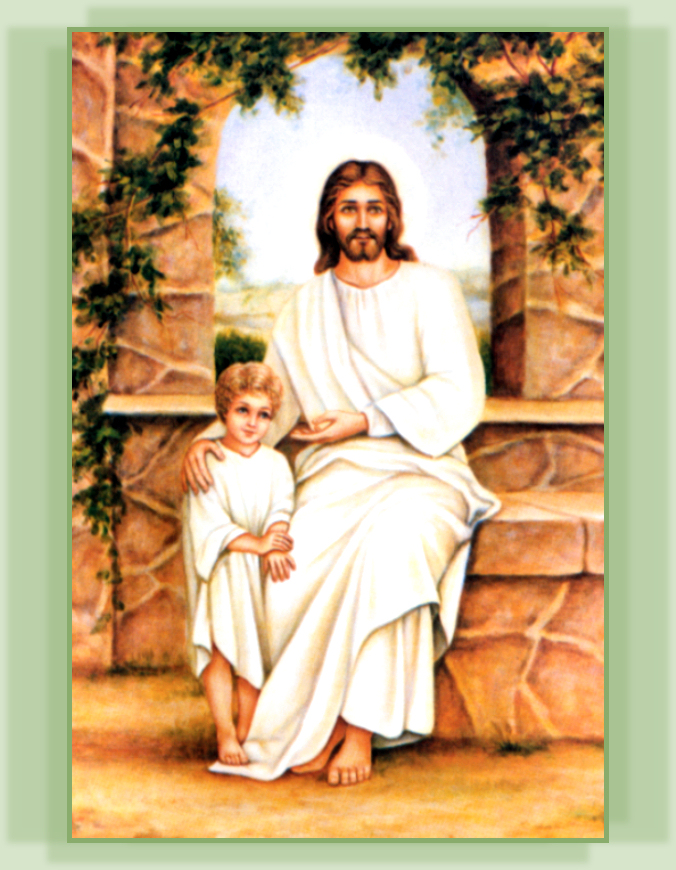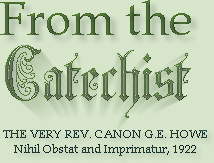  TAN BOOKS AND PUBLISHERS The Rule of Life and the Third Article of the Creed, Part 2 873. THE CURE OF ARS AND THE BIRDS.-----One day, in the springtime, the Cure of Ars was going to see a sick person. The bushes were full of little birds that were singing with all their might. The good priest stood for a moment to listen to them, and then said, with a sigh: "Poor little birds, you were created to sing, and you sing. Man was created to love God, and he does not love Him."-----O, my child, love God with your whole heart.-----Chisholm 874. S. PERPETUA AND HER FATHER.-----During the persecution which raged against the Christian religion under the reign of the Emperor Severus, a lady of quality, named Perpetua, with an infant at her breast, was arrested and cast into a loathsome prison. Among other trials which she had to undergo, the babe that she was nursing was torn from her arms at an age when it most needed its mother's tender care; but though her heart was wrung with anguish, she generously made the sacrifice which God required from her, and committed it with confidence to the keeping of its Heavenly Father. But the greatest of all the trials which she had to bear was at the hands of her own father, who was still a pagan, and who loved her passionately. Being admitted to have access to his daughter, in order that his entreaties and the sight of his distress might overcome her constancy, he left nothing undone to try to shake her resolution. The affectionate heart of Perpetua was deeply moved at the sight of the tears and distress of her aged father; but her pain was redoubled when she beheld him beaten with a stick, by order of the judge, in order to drive him from her presence. Her constancy. however, and her fidelity to Jesus Christ continued unshaken; for she remembered the words of Our Lord, "He that loveth father or mother more than Me is not worthy of Me." S. Perpetua having thus, by the power of Divine love, triumphed over the feelings of nature, completed her glorious course in the amphitheater, where she was first tossed by a furious bull, and afterwards beheaded.-----Butler 875. S. EDMUND AND THE HOLY CHILD.-----While S. Edmund, afterwards Archbishop of Canterbury, was studying in Paris, he often used to walk in the fields by the riverside, in order to meditate on sacred subjects. One day he beheld before him a boy of exceeding beauty, whose countenance was white and ruddy, and who saluted him saying, "Hail, my beloved!" The stranger then asked Edmund if he did not know him. Edmund replied that he did not remember to have seen him. Upon which the boy exclaimed, "It is strange that you do not know me, for I sit by your side in the schools, and wherever you go, I am with you." He then told Edmund to look at his face, and see what was written on his forehead. Edmund looked and read, "Jesus of Nazareth, King of the Jews." From that time the holy youth became more and more inflamed with the love of his Redeemer, and devoted himself more than ever to the meditation of His Sacred Passion.-----Cistercian Legends 876. "GOD KNOWS MY NAME."-----A poor Irishwoman, some years ago, went to a priest in America, and asked him to forward to Ireland some help to those who were suffering from famine. "How much can you spare?" asked the priest. "I have a hundred dollars saved," she said, "and I can spare that sum." The priest began to reason with her, saying that the gift was too great for her slender means. But all he said could not make her change her mind. "It will do me good to know that I have been able to help a little," she said, "and I shall be able to rest happier when I think of the poor families I have saved from hunger and death." The priest then took the money she offered him, but as he did so his eyes filled with tears. "Now, what is your name?" he asked, "that I may have it published." "My name?" she exclaimed in surprise; "don't mind that, Father. Just send them the help. God knows my name, and that is quite enough for me."-----Chisholm 877. BROTHER GILES.-----S. Bonaventure, General of the Franciscan Order, had among his religious a lay brother, named Giles, who had been one of the first companions of S. Francis, and was a man of extraordinary simplicity and innocence of life. Speaking one day to S. Bonaventure, Brother Giles asked him how it was possible for himself, ignorant as he was, to make a proper return to God for the many marks of love which He had shown him. " It is easy to do so," said the Saint, "you have only to love God, and there is no one who cannot love Him, with the help of His grace." "What," said Brother Giles, "can an ignorant man love God as much as a learned doctor?" "Certainly," replied S. Bonaventure, "and a good woman can love God even more than the cleverest theologian." At these words Brother Giles, transported with joy, ran into the garden, and out upon the high-road, crying aloud, "Come, simple, ignorant men, come, good women, come and love Our Lord. You can love Him as much and even more than Father Bonaventure or the cleverest theologian." Then falling into a profound meditation, he pondered on the reflection that all that God regards in us is the degree of love that we bear Him, a thought which overwhelmed his soul with joy and consolation.-----Anecdotes Chrétiennes 878. THE INVISIBLE HOST.-----A young man at Mass, being unable to see the Sacred Host, drew nearer to the celebrant, and yet his efforts were fruitless, however near he got to the altar. This marvelous state of things lasted two years, after which, full of scruples and trouble, he consulted a discreet and learned priest on the subject. This Confessor discovered that his visitor bore hatred against a neighbor, and refused to be reconciled to him. He explained how it was, that being devoid of charity, Our Lord implied by this prodigy that the young man had no part in the Sacrifice, in spite of his bodily presence. After this advice, the young man repented: he pardoned his enemy, and promised to seek no further revenge. Making his peace with God in a good confession, he was henceforth able, like all the rest, to see the Sacred Host at Mass.-----A Kempis 879. THE BISHOP AND THE LEPER.-----A Bishop in France was journeying across the country, when he fell in with a leper imploring help in mournful tones. The Bishop at once dismounted, and gave him an abundant alms. "It's not money I need," said the leper, "but I want you to remove the matter that covers my face." The Bishop at once began to comply with this request with his fingers and a soft silk handkerchief as gently as he could. But the leper complained of that even, as most painful, and asked for something softer still. "The touch of your tongue," he said, "is as much as I can bear." At so strange a request, the heart of the prelate was agitated with conflicting emotions: grace and nature were struggling within. Grace at length prevailed, and with the eyes of faith, seeing in the leper Christ Himself, he did violence to his natural feelings and applied his tongue to the loathsome countenance, when, behold, instead of repulsive discharge, a gem of great value and beauty was inserted within the lips of the man before him, the leper being none other than Our Lord Himself, Who assumed before the prelate's eyes the form of a comely youth.-----Cæsarius 880. S. FRANCIS AND THE LAWYER.-----A lawyer in Geneva had sworn implacable hatred to S. Francis of Sales, and never ceased loading him with insults and injuries. One day the Saint, going up to him, took him by the hand, and with great gentleness said: "You are my enemy, I know: yet if you were to pluck out one of my eyes, I would still behold you with the other in all kindness." But this meekness was lost on that brazened heart, and later on, the man actually drew a revolver on the prelate; he missed his aim, but hit a priest beside him, in consequence of which he was condemned to death. The Saint, however, pleaded so effectively in his behalf, that the sentence was commuted. In spite of this, the hardened sinner spat the Saint in the face, to which the latter, terrified at the sight of such hardness of heart, merely said: "I have been able to save you from human justice: but unless you change your dispositions, you will fall into the hands of Divine justice, from which no power can save you."-----His Life: Jan. 29 136. SATAN HATES HUMILITY.-----S. Macarius was once going to his cell with some palm leaves, with which he was accustomed to make mats. Satan appeared to him carrying a scythe, with which he tried to strike him. But he could not touch him. "O Macarius," he said to him in a tone of great anger, "how grieved I am that I cannot strike you. I can do the works you do better even than you. You indeed sometimes fast, but I am always fasting; you sometimes watch when others sleep, I never sleep. But there is one thing that makes you stronger than I am, and that is your humility."-----Chisholm 137. DEVOTION TO THE HOLY FAMILY.-----S. Vincent Ferrer relates that a pious merchant was accustomed to give dinner every Christmas day to three poor persons-----a man, a woman, and a child------intending to honor thereby the Holy Family. As the merchant lay on his death-bed, Jesus appeared to him, along with Mary and Joseph, and said to him in his sleep: "Since you so often gave us to eat on Christmas day, you shall now be our guest in Heaven." The merchant awoke much refreshed, and inundated with spiritual joy; he fell asleep in the Lord shortly after, dying the death of the Just.-----Catechisme en Exemples E-MAIL E-MAIL HOME--------------CHILDREN'S DIRECTORY----------------PENNY CATECHISM www.catholictradition.org/Children/catechist-7.htm |